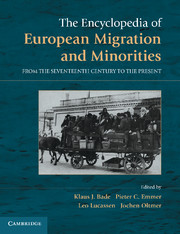Book contents
- Frontmatter
- Contents
- Preface to the English Edition
- Preface to the German Edition
- The Encyclopedia: Idea, Concept, Realization
- Terminologies and Concepts of Migration Research
- Countries
- Northern Europe
- Western Europe
- Great Britain
- Ireland and Northern Ireland
- The Netherlands
- Belgium and Luxembourg
- France
- Central Europe
- Southern Europe
- East-Central Europe
- Southeastern Europe
- Eastern Europe
- APPENDIX
- Index of Migration Types
- Index of Countries, Regions, and Places
- References
Belgium and Luxembourg
from Western Europe
Published online by Cambridge University Press: 05 June 2012
- Frontmatter
- Contents
- Preface to the English Edition
- Preface to the German Edition
- The Encyclopedia: Idea, Concept, Realization
- Terminologies and Concepts of Migration Research
- Countries
- Northern Europe
- Western Europe
- Great Britain
- Ireland and Northern Ireland
- The Netherlands
- Belgium and Luxembourg
- France
- Central Europe
- Southern Europe
- East-Central Europe
- Southeastern Europe
- Eastern Europe
- APPENDIX
- Index of Migration Types
- Index of Countries, Regions, and Places
- References
Summary
For a long time the migration history of Belgium and the much smaller Luxembourg have run in parallel. The region experienced a period of affluence in the late Middle Ages, which led to an influx of immigrants. The 16th and 17th centuries were less prosperous in economic terms, which in turn changed the flow of migration. The region which today comprises Belgium and Luxembourg remained an area of emigration rather than immigration until the 20th century. This only changed when industrialization took hold in the 19th century and when, in the 20th century, heavy industry drew large numbers of migrant workers. Historical research focuses, for the most part, on migration in the last two centuries, while the migration streams in the early modern period remain underexposed.
The region and its borders
Until 1713 the region that today forms Belgium and Lux- embourg fell under Spanish sovereignty followed by Austrian Habsburg rule. After a short French interlude (1795–1815) the area became a part of the Kingdom of the Netherlands under the Dutch king Willem I. In 1830 Luxembourg along with Belgium chose to secede from the Netherlands. An important part of the old Grand Duchy of Luxembourg became incorporated with Belgium while the remainder of Luxembourg, the part that held dynastic ties to the Netherlands, eventually became an autonomous state in 1839.
- Type
- Chapter
- Information
- The Encyclopedia of European Migration and MinoritiesFrom the Seventeenth Century to the Present, pp. 44 - 51Publisher: Cambridge University PressPrint publication year: 2011
References
- 2
- Cited by



